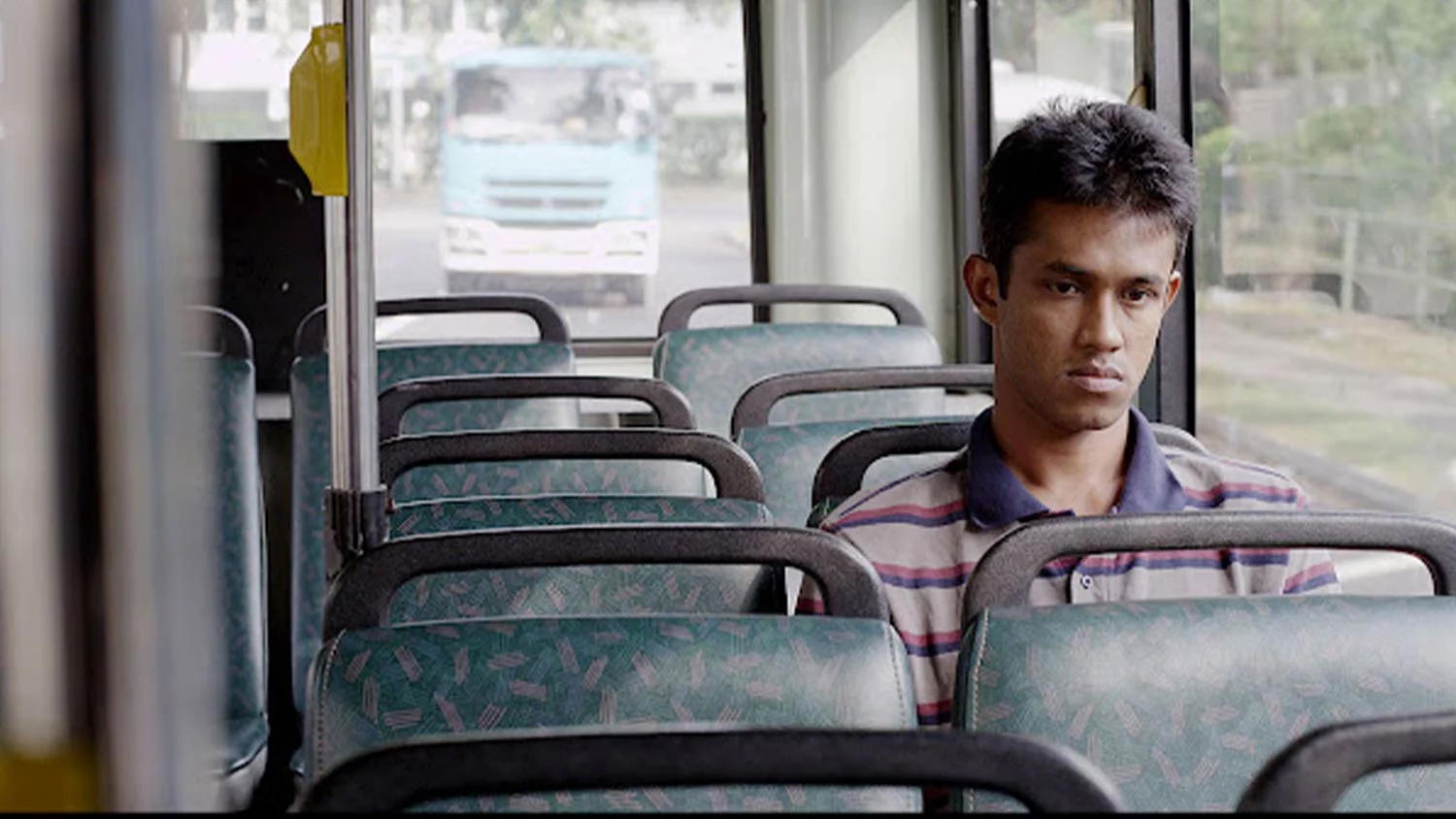This is Home, Surely?
By Shoon Li Ling
Films Not Working Today (Shijie Tan, Singapore) Dahdi/Granny (Kirsten Tan, Singapore) Armed with a flimsy red plastic bag containing his most precious possessions, a disobedient man sets off into an urban jungle, risking his life for an important visitation. In a neighbouring offshore island, an uninvited girl wolfs down poor Granny’s lunch as others deliberate her fate – except she is no Goldilocks, and these are not fairy tales. As part of a href=http://sgiff.com/films/southeast-asian-short-film-competition-programme-1/Programme 1 of the SEA Short Films, Not Working Today (Shijie Tan) and Dahdi/Granny (Kirsten Tan) shatter the illusions and stereotypes of the home we live in, by spinning a fresh thread of stories about an unsettling and unsettled Singapore through the lens of the displaced outsider. The mistreatment of migrant workers in Singapore is given an authentic and urgent take in Not Working Today. Shijie Tan volunteered with the non-profit organisation a href=http://twc2.org.sg/Transient Workers Count Too (TWC2), and after learning about the multitude of troubles plaguing foreign labourers, felt that the time was ripe to make his film.

In a clever twist, the clichéd view of migrant blue-collared labourers as a collective, exploited throng is turned upon its head. Falling far from the fantasy of Little Red Riding Hood to reside in the plane of the human, Apu Ahasan (played by Abu Ahasan, whom Shijie Tan reached out to from a drama troupe in TWC2) is not so much a helpless victim waiting to be saved from Big Bad Wolves, but rather a fiercely brave, street-smart and discerning individual whose situation is grounded in reality.Patriarchal power structures keep a predatory eye over our protagonist, who is decidedly bent on what the title asserts – to not work today. This action (or inaction, rather) sounds simple enough, yet as the narrative unfolds, we realise that this not a mere act of selfish rebellion, nor is it one that is easy to carry out. Not Working Today charts the journey of Apu’s rebellious quest for justice: to be seen and heard, in a country so foreign to him in its landscape and language.Returning to the overused image of the mob that is so commonly employed to view the foreign labourer as a collective, we see how this is now subverted to paint a suggestive, if faceless, portrait of local authority. Apu’s boss, the officers at the Ministry of Manpower, and even the receptionist at the counter are meticulously positioned with their heads cut off by the frame. What is most unsettling, however, is how we can only come to understand Apu’s difficulties through the eyes of the authority: the camera is always unabashedly facing our protagonist, forcing us to assume the point-of-view of the powers-that-be, and as a result, calling into question the apathetic attitudes that govern Apu’s situation.As dusk settles, the dust does not. After an entire day’s futile voyage, Apu finds himself looking across a dreary, grey cityscape of Singapore from a height, and we wonder whether this portends a potential end for him. Yet this single, wordless shot proves a valuable vantage point: perhaps this landscape is not as foreign to him as it appears to be. After all, Apu’s hands are one of the many thousand that have helped to build the strapping skyscrapers in the background.Questions of home and the outsider are also raised in Kirsten Tan’s Dahdi/Granny , a fictional reimagining of the a href=http://globalvoicesonline.org/2012/12/23/rohingya-refugees-rejected-by-singapore/2012 Rohingya refugee situation, set in the offshore island of Pulau Ubin, a home away from home. Tan’s untamed Ubin is beautiful, idyllic – ideal, even – the lush greenery, rough roads and simple life depicted hearken back to a forgotten Singapore where time, memory and history have come to a standstill. Yet an implicit threat looms over the horizon, biding its time in the form of a fishing boat of mysterious origins and inhabitants. This menace reveals itself, anti-climactically, to be a Rohingya girl, one of the many persecuted Muslim minorities fleeing from Myanmar. A lively, loquacious Granny grants her temporary shelter in her home, and by navigating geographical, religious, and linguistic hurdles, the two women soon form an unlikely affable pair.We start to wonder who the outsider really is: Granny appears just about as lost and displaced as the Rohingya girl, and as details unfold, we realise how the two have more in common than what is shown on the surface. As their experiences overlap and converge, boundaries between home and the outsider become increasingly blurred.As with the faceless authority in Not Working Today , here in Dahdi/Granny we see the disembodied voice and invisible hand of the state filter across the waters, insidiously seeping through the island to corrupt Granny’s decisions. Home as a safe, comforting sanctuary is tainted, transformed and made disturbingly foreign, heimlich into unheimlich , as Granny finds herself trapped in a moral dilemma, caught between the state’s sanctions and her heart’s desire.Like a steaming hot bowl of porridge gone cold, both Not Working Today and Dahdi/Granny effectively build up the hopeful optimism of a happy ending, but leave us with a lingering desire for more warmth. Not your usual whimsical fairytale of a Singapore slathered with sentimental nostalgia, these two films avoid falling into the trap of romanticising home through rose-tinted glasses.

